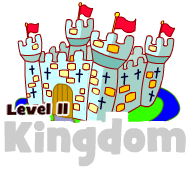 Level.
Level.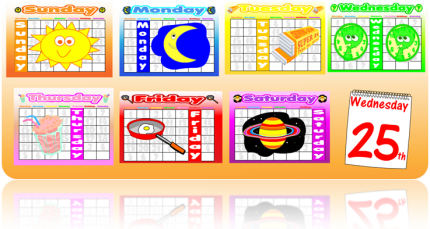
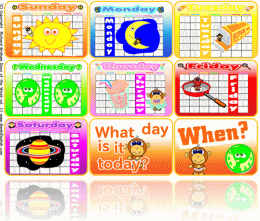
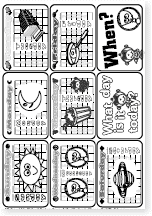
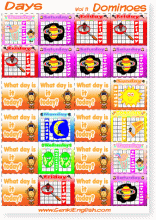
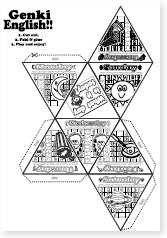
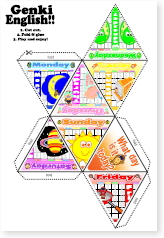
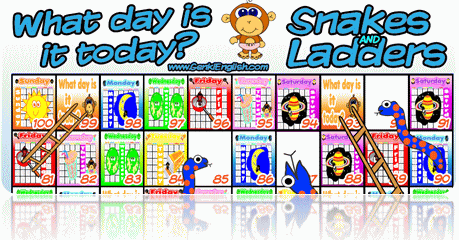
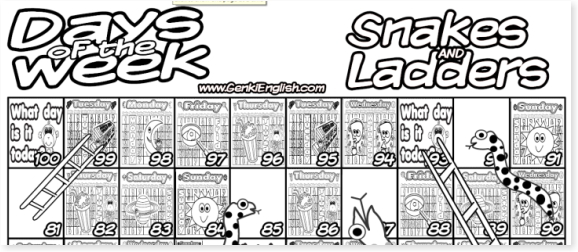
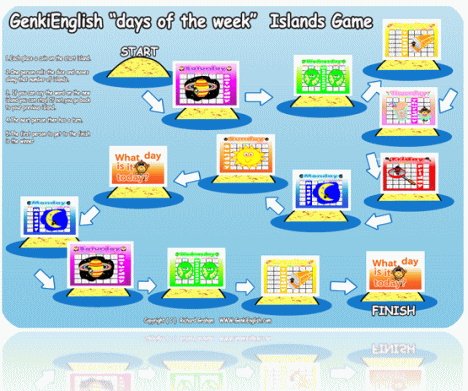
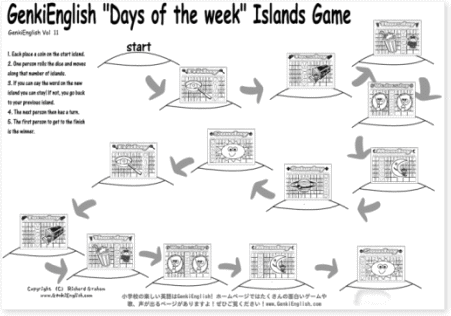
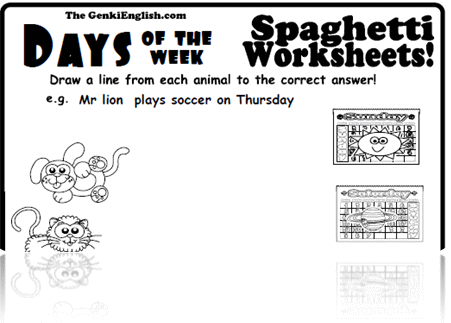
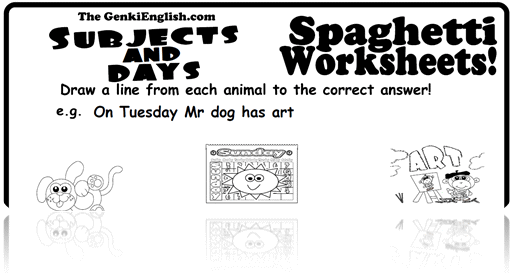
The Download Pack also includes the narrated Sports & Days of the Week Picture Book!

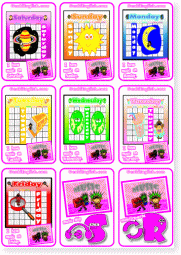
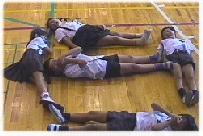
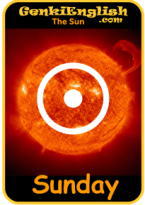
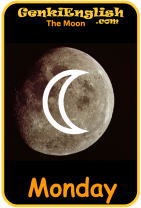
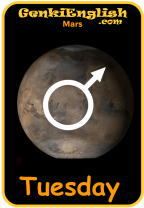
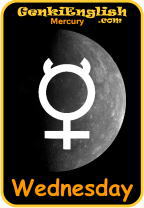
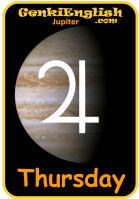
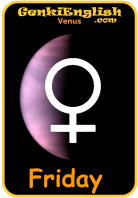
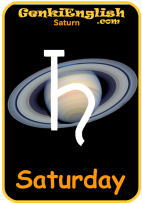
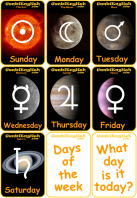
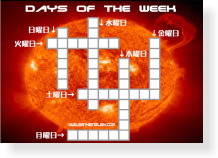
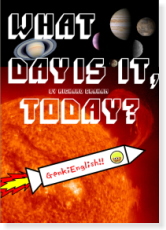
Or try out these ideas from Atley Jonas...
Target English: Days of the Week, asking "What day is it?"
Target grade: Elementary 3 to Junior High school 1
Recommended Game: The Borg - Week-Long War - Mushi Battle
by Atley Jonas
Normally, not a very engaging topic but one that is frequently requested by Japanese teachers of English. It can be made very enjoyable and the games are lots of fun! I probably wouldn't try to teach this to younger kids due to its relative complexity, but my grade 4 kids enjoyed the story with the planets and they knew their order in the solar system better than I did! Associating each day's name with the picture of a planet seems to be a really effective mnemonic.

First, I have the Japanese teacher write the kanji ( Japanese character
) for each day of the week across the top of the blackboard. Then, I have
the kids tell me what each kanji actually means (in Japanese & in English),
eg. ka-yobi = fire day, sui-yobi = water day, kin-yobi = gold day, etc.
I call up students and have them sketch a quick picture underneath each
kanji.
I then go on to explain that in English, we have a similar system, except that we use the names of planets. I point out that Sunday and Monday have the same meaning in English as they do in Japanese.
Next, I show them a flashcard for Tuesday. I explain that in English, planets
are named for Roman and Greek gods. In languages like French and Spanish,
they still use the names of the Roman gods. But since it was Germanic people
who helped create the English language, they used a mix of their own gods
and the old Roman gods.
Tuesday was named for the Norse god Tyr, which they pronounced: Tewe. Hence, Tewe's
Day.
Wednesday was name for Odin (Woden), who replaced the god Mercury (Woden's Day).
The god Thor replaced Jupiter (Thor's Day).
The goddess Frigg (or Freida) replaced Venus for Friday,
and Saturday kept the Roman god Saturn.
Finally, Sunday, of course, is named for the sun.
I also explain, that we don't have kanji in English, but we do have traditional symbols for each planet (which I've incorporated into the flashcards to help distinguish between planets like Mars and Venus).
After the kids can identify each day in English with a reasonable level of confidence, I introduce the mini-cards and one of the games below.
Game idea 1:
 Target Grade: Elementary 3 - Junior High 1
Target Grade: Elementary 3 - Junior High 1
Target English: Days of the Week, "What day is it?"
Preparation: Days of the Week mini-cards
The object of the game is to assimilate a collective that consists of an entire "week." This game is functionally similar to "snake tag" or "red rover" you may have played as a kid.
1. Students each get one mini-card for a day of the week (Monday - Sunday).
2. The students "mingle" amongst each other and find a partner.
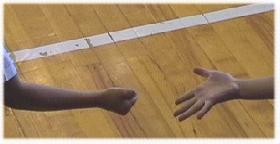
3. They do janken ( Rock, Paper, Scissors ) . The winner of janken asks the loser a question: "What day is
it?"
4. The student answers with the day of the week printed on his card. Eg. "It's Monday."
5. If the day of the week on the that student's card matches the first student's card, he is free to go. If his card is different, he gets "assimilated" and must latch onto the first student (by putting his hand on the students shoulder or hanging onto his shirt).
6. The pair of students now try to assimilate other students into their collective by repeating steps 2 to 5.
7. Each student that becomes part of the collective must have a different mini-card from all other members of the collective he is joining, (eg. two Wednesdays are not allowed). If his card matches any of the other members, he is either free to go, or must rejoin the collective that he got pulled out of.
8. Students in the collective should take turns initiating "janken" with other students.
9. Any student from any collective may initiate janken with any other student, whether he is already part of another collective or not. Ie. you can steal members from other collectives. :-) No "tag-backs" though.
10. The first collective to gather 7 members, each with a different "day of the week" mini-card wins the round/game.
Game idea 2:
Target Grade: Elementary 3 - Junior High 1
Target English: Days of the Week, "What day is it?"
Preparation: Days of the Week mini-cards
The object of this game is to collect all seven "day of the week"
mini-cards to assemble an entire week. It is based on the children's' card
game: "war" and the GenkiEnglish Card Game.
1. Each "day of the week" mini-card has a number on it, corresponding to how far the planet is from the sun.
Ie.
Sunday = Sun = 0
Monday = Moon = 3
Tuesday = Mars = 4
Wednesday = Mercury = 1
Thursday = Jupiter = 5
Friday = Venus = 2
Saturday = Saturn = 6
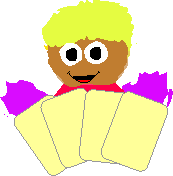
2. Each student receives 3 or 4 mini-cards (preferably all different).
3. When the teacher says "go" students find a partner and "janken" to see who gets to ask the question: "What day is it?"
4. Both students shuffle their stacks face-down. The student who won "janken" asks the question. The second student turns over the top card in his stack answers with the day printed on it, eg. "It's Wednesday."
5. The asking student turns over his own card.
6. The student with the planet that is farthest from the sun (the larger of the two numbers) wins his opponent's card and puts both cards back in his stack.
7. In the case of a tie, either janken to decide the winner, or put the two cards down and repeat steps 3 and 4. The winning student wins all four cards.
8. Several times during the game, (but not too often or it becomes confusing), the teacher should reverse the rule, so that the smaller number (the closest planet to the sun) wins the round. That makes things fair for those students who got "stuck" with low-numbered cards.
9. The winner of the game is not who has the most cards but the student who is first to collect all seven days in a week. So if a student collects three "Friday" cards, they only count as one.
Tip 1: I found that explaining this game to the Japanese Teacher and playing
a few sample rounds with him/her prior to the class helps tremendously
in conveying the message to the kids and explaining the rules if they can't
understand.
Tip 2: It may help the game go smoother if, for the first two rounds or so, you practice the game as a class, with the students playing with their neighbour sitting next to them before you set them loose on anyone.
Game idea 3:
GenkiEnglish Mushi Battle game (as printed, with mini-cards) using days of the week. The objective being
to collect a whole week.
Sign up to get my top tips, games & hints via email! |
 |
|---|
|
|